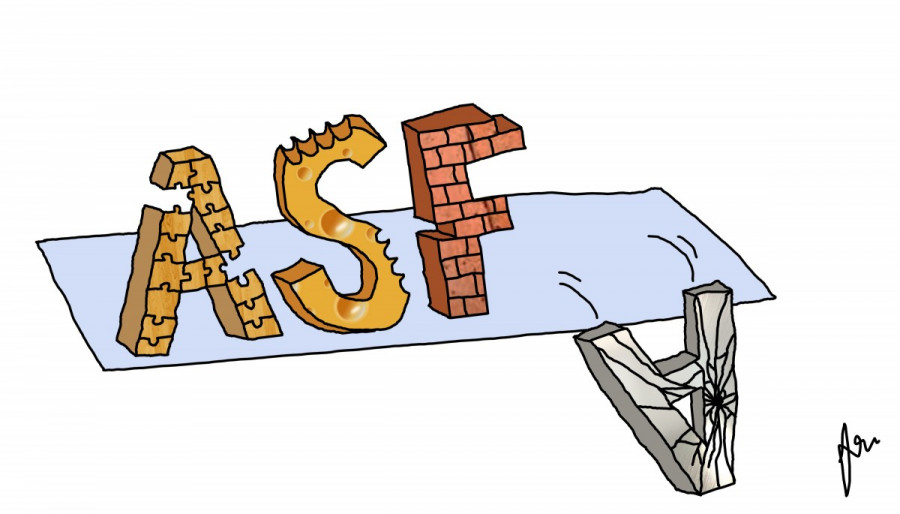Editorial: What Is the Point of ASFA?
“ASFA in principle is a good thing, but it needs to be changed dramatically.”
You might assume this was a quote from our article this week on why the Arts and Science Federation of Associations—which represents all Concordia undergraduate arts and science students—again failed to meet quorum in a by-election.
But it’s not. This is from a Link story in 2010, when leaders from the Mathematics and Statistics Students Association expressed their discontent with how the federation distributed funds to its then 27 member associations. MASSA execs wanted more autonomy from ASFA and thought the federation mismanaged its funds.
Fast-forward six years and a discontent still exists with how ASFA operates. Current executives called this recent by-election to fill a vacant spot on their team and to request a higher fee-levy from its membership.
With approximately 20,000 students in the federation, they needed 505 members to vote to reach quorum. They had a turnout of around 200.
This is the second time in two years that an ASFA election hasn’t met quorum. The last time was in March 2015 just after the story about Mei-Ling made local headlines.
Mei-Ling was a former executive whose two white male colleagues sexually and racially harassed her. This time around, though, there hasn’t been public scandal or dysfunction. ASFA has been quiet.
But this doesn’t mean that ASFA should hide in its failures and maintain the low bar it has set. If anything, the lack of interest in this by-election should be a wake up call that the biggest student association at this university, barring the Concordia Student Union, needs to restructure.
Last year, ASFA membership had the chance to pass a formal reform proposal, but it failed. After being reviewed by a lawyer and put to ballot by council, the proposal would have reduced the number of executives to three.
As well, ASFA would have essentially turned into a body that collects and distributes funds and implements consent and anti-oppression training to its member associations.
“Essentially we’re cutting out anything that ASFA does, and we’re just giving all the autonomy to the member associations,” said former ASFA General Coordinator Jenna Cocullo about the failed proposal. “ASFA will really just be there for the simplicity of allocating budgets.”
We believe this was and still is the best option for the federation moving forward. Since most of ASFA’s member associations aren’t accredited and recognized by the Quebec government, it’s important to have a body that can collect student fees to be put towards different community building initiatives.
Cocullo and her Support Change slate last year, which The Link formally endorsed, couldn’t fulfill the promise her team campaigned on.
There are simply too many member associations within ASFA for it to form a unified, clear vision year-to-year. Attend a council session and see for yourself—it’s tense and usually unproductive.
Once, council spent an agenda point discussing why the office couch was swapped without permission, before discussing whether the council chair assaulted someone at the previous meeting. Many have used the term “toxic” before to describe the federation’s environment.
Since the Mei-Ling story revealed how unsafe ASFA was internally, a contingent of apologists have fought desperately to protect the tense frat-boy party atmosphere the federation is known for.
Its high-profile event each year is Frosh, a week of events meant to be an orientation of sorts to new students. In reality, it’s an excuse for ASFA leaders to spend thousands of dollars on a party that affirms their status as the cool kids.
We too ask why ASFA even needed an increased fee-levy in the first place. There was no real campaign to explain. Getting documentation or even notice of council meetings has become increasingly difficult.
The finance committee, which makes final decisions on all budgets, has been accused of lacking transparency and operating unprofessionally in the past.
ASFA suffers from an issue of having too much money and not knowing what to do with it. Last year, despite all its grand intentions, the executive team spent $16,000 to have controversial YouTuber Laci Green come speak at Concordia. The cost to a run this by-election, which again didn’t meet quorum, was $4,500.
Since the revelation that the Frosh culture permeating its operations is dangerous and needs to be addressed, ASFA has lacked a clear vision for how to move forward. This has led to mismanagement of funds and more internal drama.
After years and years of coverage, The Link continually asks, what is the point of ASFA? The silence of its members in the recent by-election may be a sign that they’re wondering too.





_600_375_90_s_c1.JPG)
__600_375_90_s_c1.jpg)